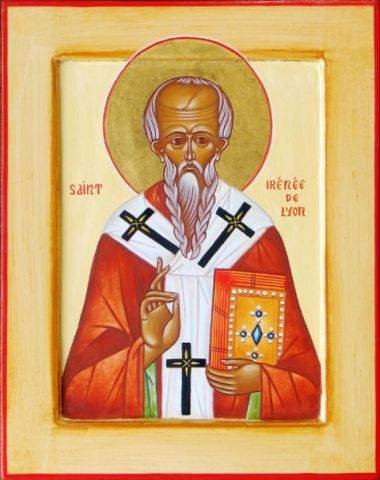
St. Irenaeus (ca. A.D. 125–ca. 200).
Today is the feast day of St. Irenaeus (ca. A.D. 125–ca. 200), one of the earliest witnesses we have to the authority of the Church and to the doctrine of apostolic succession. I’m still trying to dig my way out from under this thesis, but I thought I would bring you a few quotes I’ve discovered recently that I found powerful.
Atheists and other critics of Christianity argue that there is little historical evidence of Jesus or even of the Apostles. The Gospels are, of course, valid historical sources in their own right; but in Irenaeus we have someone who was only one generation departed from the Apostles, who was the disciple of St. Polycarp, who himself was the disciple of the Apostle St. John the Evangelist. Irenaeus testifies clearly to his memories of Polycarp, who knew not only St. John, but also many others who had known Jesus Christ in the flesh. Irenaeus brings us almost tangibly to the feet of the Apostles and within earshot of Jesus Himself.
First, Irenaeus testifies explicitly to Polycarp’s memories of John and others who had known Jesus (Irenaeus, Letter [II] to Florinus):
For I have a more vivid recollection of what occurred at that time than of recent events … so that I can even describe the place where the Blessed Polycarp used to sit and discourse — his going out, too, and his coming in— his general mode of life and personal appearance, together with the discourses which he delivered to the people; also how he would speak of his familiar intercourse with John, and with the rest of those who had seen the Lord; and how he would call their words to remembrance. Whatsoever things he had heard from them respecting the Lord, both with regard to His miracles and His teaching, Polycarp having thus received from the eye-witnesses of the Word of life, would recount them all in harmony with the Scriptures. These things, through God’s mercy which was upon me, I then listened to attentively, and treasured them up not on paper, but in my heart; and I am continually, by God’s grace, revolving these things accurately in my mind.
Here Irenaeus testifies to Polycarp’s appointment as bishop of Smyrna by the Apostles themselves, to his place in the apostolic succession, and to the crucial role apostolic succession played in rejecting the claims of heretics (Against Heresies III.3.4):
But Polycarp also was not only instructed by apostles, and conversed with many who had seen Christ, but was also, by apostles in Asia, appointed bishop of the Church in Smyrna, whom I also saw in my early youth, for he tarried [on earth] a very long time, and, when a very old man, gloriously and most nobly suffering martyrdom, departed this life, having always taught the things which he had learned from the apostles, and which the Church has handed down, and which alone are true. To these things all the Asiatic Churches testify, as do also those men who have succeeded Polycarp down to the present time,— a man who was of much greater weight, and a more steadfast witness of truth, than Valentinus, and Marcion, and the rest of the heretics. He it was who, coming to Rome in the time of Anicetus caused many to turn away from the aforesaid heretics to the Church of God, proclaiming that he had received this one and sole truth from the apostles — that, namely, which is handed down by the Church.
Thanks to Bryan Cross and Called to Communion for these quotations, and for a splendid exposition of justification in the thought of St. Irenaeus.

